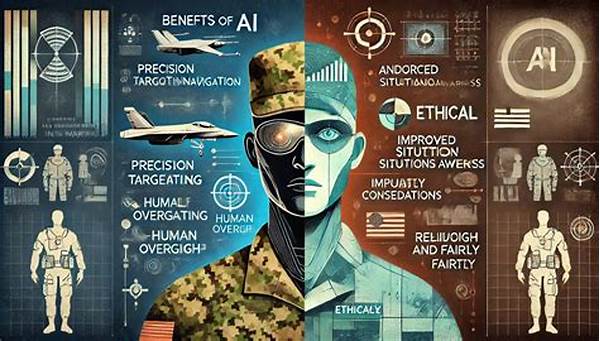As the world rapidly shifts into the digital age, artificial intelligence (AI) stands at the forefront of technological advancement, igniting significant debates, particularly regarding its role in national defense. Imagine a world where drones, surveillance systems, and even combat robots operate with full autonomy, making decisions that could alter the course of history. It’s not just the stuff of science fiction; it’s an impending reality. Regulating AI autonomy in defense sectors has thus become one of the most pressing issues of modern times. This isn’t about stifling innovation—it’s about channeling it effectively to ensure global security and ethical use.
The allure of AI in defense is understandable. It promises efficiency, precision, and power dynamic shifts, potentially reducing human error and increasing response times. Yet, as defense sectors across the globe race towards integrating AI, there’s growing concern about unfettered autonomy and the moral implications of delegating life-and-death decisions to machines. Picture a battlefield where AI systems make rapid strategic decisions without human oversight. The ramifications of this autonomy could be dire if not regulated adequately. Historical concerns about the arms race take on new dimensions when autonomous AI is in play.
In the quest to regulate AI autonomy in defense sectors, various stakeholders, from policymakers to technologists, face a multifaceted challenge. On one hand, there’s the undeniable benefit of harnessing AI for national security purposes. On the other hand, there’s the risk of creating uncontrollable systems that could potentially turn against their creators. It’s this balance that regulation seeks to address—assuring that advancements don’t outpace the ethical and legal frameworks necessary to contain them. What we’re dealing with is not just a technological quandary but a question of moral responsibility on the global stage.
Public perception and international cooperation also play critical roles. A robust regulatory framework for AI in defense requires not just national legislation but also international treaties, as no single nation can address the potential fallout of autonomous warfare alone. Nations must come together to establish agreements that dictate the acceptable boundaries of AI use in defense. If history has taught us anything, it’s that unilateral advancements in defense technologies often lead to escalation and conflict. For AI, this could mean grave consequences without solid regulatory frameworks.
The Complexity of Regulating AI in Defense
As we delve deeper into regulating AI autonomy in defense, the complexity of the task becomes apparent. Creating laws and policies that are flexible enough to adapt to rapid technological change while being rigid enough to prevent misuse is no small feat. The current regulatory landscape is fragmented at best, with different countries adopting varied approaches. This disparity creates potential loopholes and risks that could be exploited, further emphasizing the need for a more unified and comprehensive strategy. Understanding these intricacies is key to ensuring that AI serves as a tool of peace rather than a catalyst for conflict.
—
Comprehensive Approach to AI Autonomy Regulation
Realistically, regulating AI autonomy in defense sectors requires a multifaceted, comprehensive approach. It’s not just about setting rules; it’s about creating an ecosystem where innovation and regulation coexist harmoniously. This includes fostering collaboration between governments, tech companies, and defense organizations. It’s also about continuous learning and adaptation, recognizing that technology and the threats it poses are continually evolving. By creating spaces for dialogue, stakeholders can develop standards and practices that prioritize human safety and ethical considerations over mere technological prowess.
International Perspectives on AI Regulation
Globally, perspectives on AI regulation in defense vary. Some countries advocate for stringent controls, viewing AI as a potential threat rather than an opportunity. Others, optimistic about AI’s potential, propose more lenient frameworks that encourage its integration into defense strategies. These differing stances can complicate international cooperation efforts. However, by building platforms for shared understanding and mutual agreements, nations can work together towards a future where AI enhances rather than threatens global security.
Essential Considerations in AI Defense Regulation
Navigating the Future Landscape
The future of regulating AI autonomy in defense sectors lies in our collective ability to foresee and adapt. Innovation must continue, but it should never outstrip the frameworks that safeguard humanity. It’s about finding the right balance between technological prowess and ethical responsibility. Success in this domain will hinge on our commitment to collaborative governance, where every voice helps shape a secure and sustainable future. As history unfolds, this regulatory journey might become a blueprint for other technological frontiers. The next chapter in defense innovation demands not just smarter technology, but also wiser governance.
—
In conclusion, the path towards regulating AI autonomy in defense sectors is fraught with challenges and opportunities. It represents a dynamic intersection of technology, ethics, and international relations. While the allure of autonomous systems in defense is undeniable, responsible governance remains paramount. By embracing a proactive and collaborative approach, we can navigate this complex landscape, ensuring that AI serves as a force for peace and security rather than a harbinger of conflict. As stakeholders in the tech world and beyond, let us advocate for thoughtful regulation that aligns with our collective vision for a safer, more equitable future.
—
The Balancing Act of Regulating AI Autonomy
Managing the delicate balance between technological advancement and ethical responsibility in defense is no easy task. On one hand, the integration of AI promises to revolutionize defense strategies, offering unprecedented capabilities in warfare. Conversely, the potential for AI to make independent decisions without human intervention presents significant ethical and strategic issues. Thus, regulating AI autonomy in defense sectors requires not only sophisticated legal and technical frameworks but also a commitment to ongoing dialogue, research, and cooperation between nations and industries.

